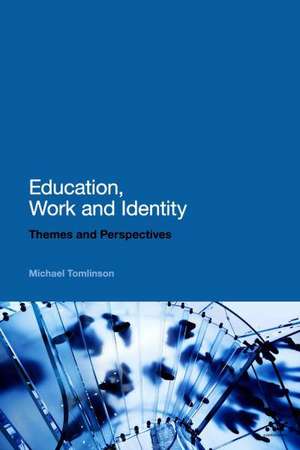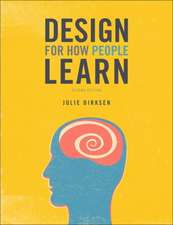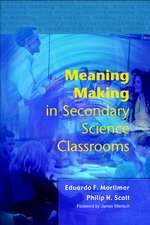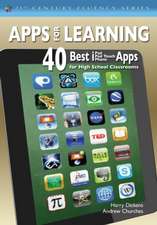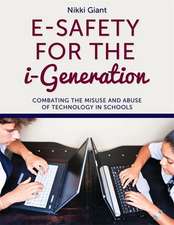Education, Work and Identity: Themes and Perspectives
Autor Dr Michael Tomlinsonen Limba Engleză Paperback – 16 ian 2013
| Toate formatele și edițiile | Preț | Express |
|---|---|---|
| Paperback (1) | 250.92 lei 6-8 săpt. | |
| Bloomsbury Publishing – 16 ian 2013 | 250.92 lei 6-8 săpt. | |
| Hardback (1) | 831.83 lei 6-8 săpt. | |
| Bloomsbury Publishing – 16 ian 2013 | 831.83 lei 6-8 săpt. |
Preț: 250.92 lei
Preț vechi: 288.41 lei
-13% Nou
Puncte Express: 376
Preț estimativ în valută:
48.02€ • 51.34$ • 40.03£
48.02€ • 51.34$ • 40.03£
Carte tipărită la comandă
Livrare economică 18 aprilie-02 mai
Preluare comenzi: 021 569.72.76
Specificații
ISBN-13: 9781441174116
ISBN-10: 1441174117
Pagini: 208
Dimensiuni: 156 x 234 x 15 mm
Greutate: 0.36 kg
Ediția:New.
Editura: Bloomsbury Publishing
Colecția Bloomsbury Academic
Locul publicării:London, United Kingdom
ISBN-10: 1441174117
Pagini: 208
Dimensiuni: 156 x 234 x 15 mm
Greutate: 0.36 kg
Ediția:New.
Editura: Bloomsbury Publishing
Colecția Bloomsbury Academic
Locul publicării:London, United Kingdom
Caracteristici
Considers the role of education and work in shaping people's identities.
Notă biografică
Michael Tomlinson is a Lecturer in Lifelong and Work-related Learning in the School of Education at the University of Southampton, UK.
Cuprins
1. Introduction to Key Themes and Perspectives \ 2. Social and Economic Transformations \ 3. The Changing Nature of Work \ 4. Conceptualizing the Relationships Between Education and Work \ 5. Vocationalism, Skills and Employability \ 6. Lifelong Learning, Learner Identities and Work-related Learning \ 7. Managing the Transition from Education to Work \ 8. Transforming Educational Institutions for Economic Gain \ 9. Higher Education, Social Change and Shifting Identities \ 10. Conclusion\ Index
Recenzii
This is a highly ambitious book which seeks to map the key changes in global knowledge capitalism, their impact on education and the labour market and their effects on the structuring of individual identities as students and workers. It is high time that we had a work of this kind which enables us to think through the relationships and issues that are posed by contemporary capitalism. Michael Tomlinson is to be commended for providing a crucial resource in debates over how we create relationships between educational, societal and economic institutions which are just and effective.
Clear in its presentation of concepts, thorough in its treatment of debate, this book crosses disciplinary boundaries to illuminate issues that are at the heart of current educational conflict and change.
Michael Tomlinson's book is notable for its impressive scholarship. He draws on wealth of literature to discuss the way in which writers have explored the themes of education, work and identity and their interrelationship. This is a coherent and clearly written text that makes a significant contribution to the literature on educational studies and provides a valuable resource for undergraduate students and those with a general interest in the above themes.
This is a serious and insightful analysis of the relationships between education and the economy. Tomlinson's book examines the complex and changing relations between education institutions, the economy and labour markets, in times of state re-organisation and wider global economic, social and cultural shifts. Using primarily a sociological approach within an interdisciplinary framework, individual people's experiences of education and labour market institutions are at the core of the book. An eloquent account of shifting identities, and an indispensable book for all those interested in the changing purposes, forms and outcomes of formal education in contemporary industrialised societies.
This excellent and well-written book makes an important contribution to sociological work on the relationship between education, work and identity and offers a fresh analysis of debates on the purpose and value of education. Michael Tomlinson confidently steers the reader through some complex and contested debates about the changing nature of the relationship between education and work and about how individuals - whether as educational workers or learners- are positioned by such change. This book deserves a wide readership but it should appeal especially to students of education and sociology.
Clear in its presentation of concepts, thorough in its treatment of debate, this book crosses disciplinary boundaries to illuminate issues that are at the heart of current educational conflict and change.
Michael Tomlinson's book is notable for its impressive scholarship. He draws on wealth of literature to discuss the way in which writers have explored the themes of education, work and identity and their interrelationship. This is a coherent and clearly written text that makes a significant contribution to the literature on educational studies and provides a valuable resource for undergraduate students and those with a general interest in the above themes.
This is a serious and insightful analysis of the relationships between education and the economy. Tomlinson's book examines the complex and changing relations between education institutions, the economy and labour markets, in times of state re-organisation and wider global economic, social and cultural shifts. Using primarily a sociological approach within an interdisciplinary framework, individual people's experiences of education and labour market institutions are at the core of the book. An eloquent account of shifting identities, and an indispensable book for all those interested in the changing purposes, forms and outcomes of formal education in contemporary industrialised societies.
This excellent and well-written book makes an important contribution to sociological work on the relationship between education, work and identity and offers a fresh analysis of debates on the purpose and value of education. Michael Tomlinson confidently steers the reader through some complex and contested debates about the changing nature of the relationship between education and work and about how individuals - whether as educational workers or learners- are positioned by such change. This book deserves a wide readership but it should appeal especially to students of education and sociology.
